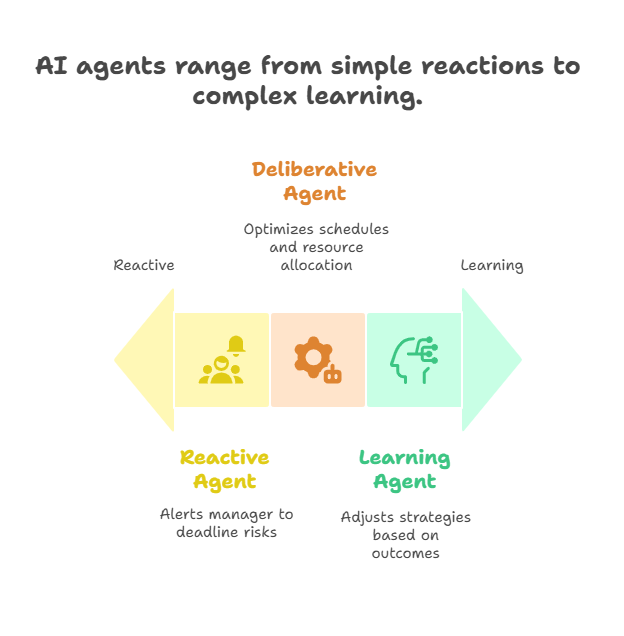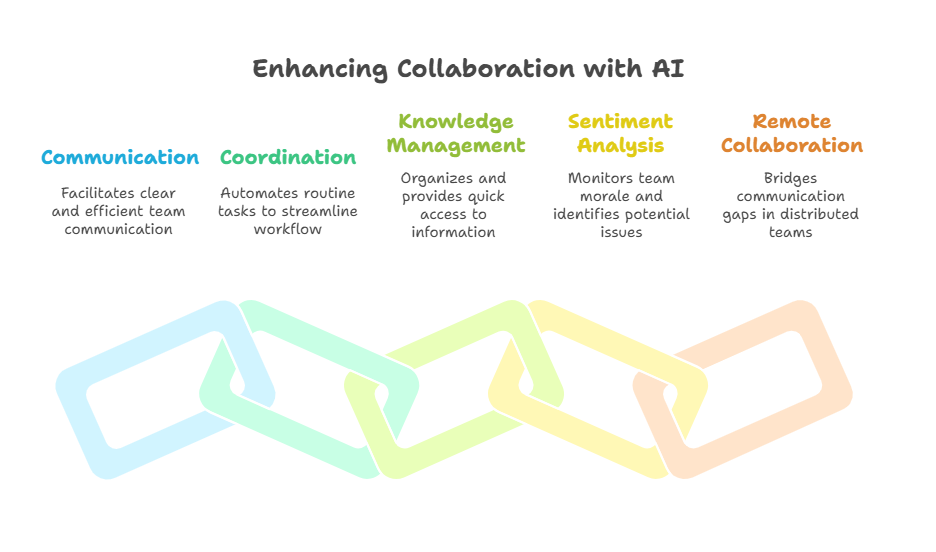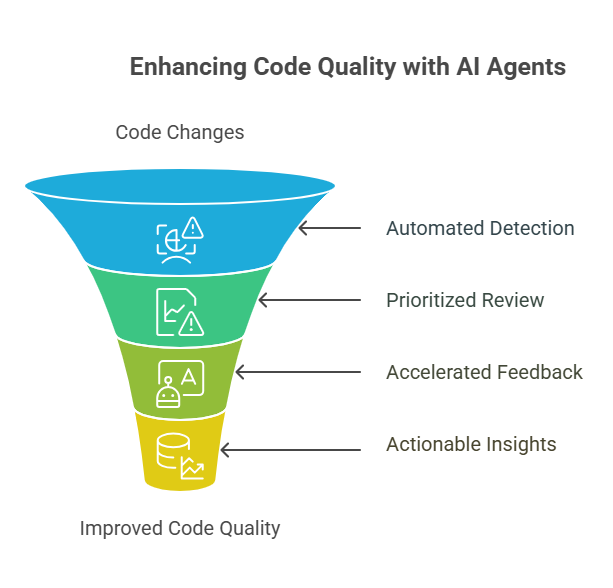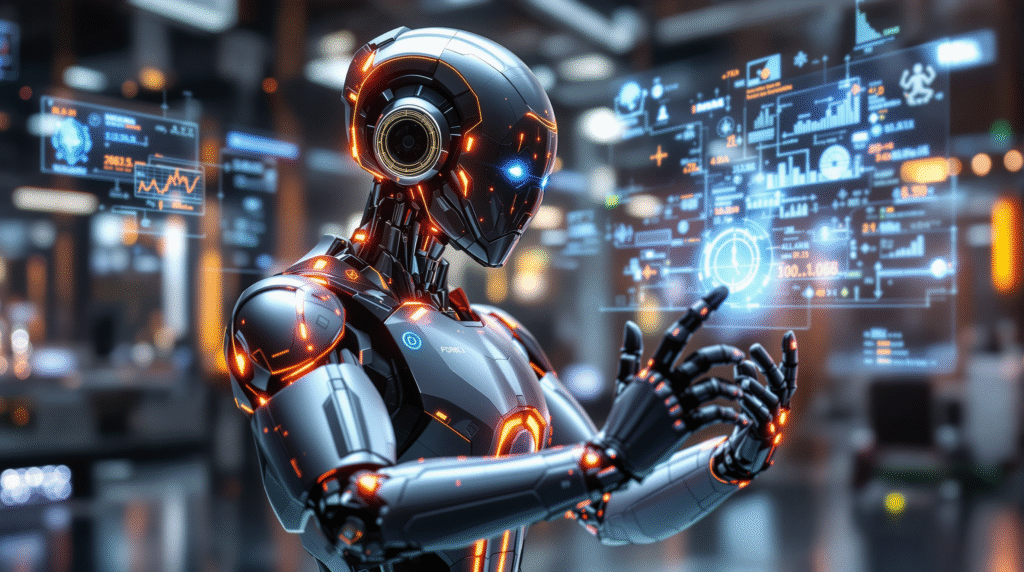Introduction: The Role of AI in Modern Project Management
In today’s fast-paced software development landscape, managing projects efficiently is more critical than ever. Traditional project management methods, while effective, often struggle to keep up with the increasing complexity, rapid changes, and high expectations of modern software projects. This is where AI agents come into play, revolutionizing how teams plan, execute, and deliver software.
AI agents are intelligent software entities designed to perform specific tasks autonomously or assist humans by providing data-driven insights and automation. In project management, these agents analyze vast amounts of data—from project schedules and code repositories to team communications and performance metrics—to help managers make better decisions and streamline workflows.
The role of AI in modern project management extends beyond simple automation. AI agents can predict potential risks, optimize resource allocation, and even suggest adjustments to project plans based on real-time progress. They enhance collaboration by facilitating communication and ensuring that everyone stays aligned with project goals.
Moreover, AI-driven tools reduce the administrative burden on project managers, freeing them to focus on strategic planning and problem-solving. By continuously learning from past projects and adapting to new information, AI agents bring a level of agility and intelligence that traditional methods lack.
In summary, AI agents are transforming project management from a reactive, manual process into a proactive, data-informed discipline. Their integration into software development projects promises increased efficiency, reduced risks, and higher-quality outcomes, making them indispensable allies for modern development teams.
Understanding AI Agents: Key Concepts and Technologies
AI agents are software programs designed to perform tasks autonomously or assist humans by processing information, making decisions, and learning from data. In the context of software development project management, these agents act as intelligent assistants that help streamline complex workflows and improve decision-making.
At their core, AI agents combine several key technologies. Machine learning enables them to recognize patterns and make predictions based on historical project data, such as timelines, resource usage, and past risks. Natural language processing (NLP) allows AI agents to understand and generate human language, facilitating communication within teams by analyzing emails, chat messages, and documentation. Additionally, automation technologies empower AI agents to execute repetitive tasks like scheduling meetings, sending reminders, or updating project dashboards without human intervention.
There are different types of AI agents used in project management. Reactive agents respond to specific inputs or events, such as alerting a manager when a deadline is at risk. Deliberative agents plan actions based on goals and available information, helping to optimize project schedules or resource allocation. Learning agents improve their performance over time by analyzing outcomes and adjusting their strategies accordingly.
The integration of AI agents into project management tools is becoming increasingly common. Platforms now embed AI capabilities to provide predictive analytics, risk assessment, and intelligent recommendations. These agents work alongside human managers, augmenting their abilities rather than replacing them.
Understanding these concepts and technologies is essential for leveraging AI agents effectively. By recognizing what AI agents can do and how they operate, development teams can better harness their potential to improve project outcomes, reduce delays, and enhance collaboration.

Project Planning and Scheduling with AI Assistance
Effective project planning and scheduling are fundamental to the success of any software development effort. However, these tasks can be complex and time-consuming, especially when dealing with large teams, multiple dependencies, and shifting priorities. AI agents offer powerful support by automating and optimizing these processes, helping project managers create realistic, adaptable plans.
AI agents analyze historical project data, team performance metrics, and current workload to generate accurate estimates for task durations and deadlines. By learning from past projects, they can identify patterns that humans might overlook, such as common bottlenecks or resource constraints. This data-driven approach reduces guesswork and improves the reliability of project schedules.
Moreover, AI agents can dynamically adjust plans in response to changes. For example, if a key developer becomes unavailable or a task takes longer than expected, the AI can automatically reschedule dependent tasks, reallocate resources, and notify relevant team members. This real-time adaptability helps keep projects on track despite uncertainties.
Another advantage is prioritization. AI agents can evaluate the impact of different tasks on overall project goals and suggest which activities should be tackled first to maximize efficiency and value delivery. They can also balance workloads across team members to prevent burnout and ensure steady progress.
In addition, AI-powered tools often include visual planning interfaces, such as Gantt charts or Kanban boards, enhanced with predictive insights. These interfaces help managers and teams understand the project timeline, identify risks early, and make informed decisions collaboratively.
In summary, AI agents transform project planning and scheduling from a static, manual effort into a dynamic, intelligent process. By leveraging AI assistance, software development teams can create more accurate plans, respond swiftly to changes, and ultimately deliver projects more successfully.
Enhancing Team Collaboration through AI Tools
Collaboration is the backbone of successful software development projects. Effective communication, coordination, and knowledge sharing among team members are essential to meet deadlines and maintain high-quality standards. AI agents play a growing role in enhancing these collaborative efforts by providing intelligent support tailored to the needs of development teams.
One of the primary ways AI agents improve collaboration is by facilitating communication. Using natural language processing (NLP), AI can analyze conversations in chat platforms, emails, and project management tools to identify key topics, action items, and potential misunderstandings. This helps ensure that important information is highlighted and that team members stay aligned on project goals.
AI agents can also automate routine coordination tasks, such as scheduling meetings, sending reminders, and tracking task assignments. By reducing administrative overhead, they free up team members to focus on creative and technical work. Additionally, AI can monitor team workload and suggest adjustments to balance responsibilities, preventing burnout and improving overall productivity.
Knowledge management is another area where AI agents add value. They can organize documentation, code snippets, and past project data, making it easier for team members to find relevant information quickly. Some AI tools even provide intelligent recommendations, such as suggesting experts within the team to consult for specific issues or highlighting reusable code components.
Furthermore, AI-driven sentiment analysis can gauge team morale by analyzing communication patterns and flagging potential conflicts or disengagement early. This enables project managers to address interpersonal issues proactively, fostering a healthier work environment.
In distributed or remote teams, where face-to-face interaction is limited, AI agents become even more valuable by bridging communication gaps and maintaining cohesion. They help create a virtual collaborative space that supports transparency, accountability, and continuous feedback.
In conclusion, AI tools enhance team collaboration by improving communication clarity, automating coordination, managing knowledge, and supporting team well-being. Integrating AI agents into collaboration workflows empowers software development teams to work more effectively and harmoniously.

Monitoring Progress and Quality with AI Agents
Maintaining visibility into project progress and ensuring high-quality deliverables are critical challenges in software development. AI agents offer powerful capabilities to monitor these aspects continuously, providing real-time insights and early warnings that help teams stay on track and uphold standards.
AI agents collect and analyze data from various sources such as version control systems, issue trackers, continuous integration pipelines, and testing frameworks. By aggregating this information, they create comprehensive dashboards that visualize project status, highlight completed and pending tasks, and track key performance indicators (KPIs) like velocity, code coverage, and defect rates.
One of the key benefits of AI-driven monitoring is early detection of potential problems. For example, AI can identify trends indicating that a feature is behind schedule, a module has an increasing number of bugs, or code quality is deteriorating. These alerts enable project managers and developers to take corrective actions before issues escalate, reducing the risk of costly delays or rework.
AI agents also support quality assurance by automatically analyzing code changes for potential defects, style violations, or security vulnerabilities. They can prioritize testing efforts based on risk assessment, ensuring that critical areas receive more attention. Additionally, AI can learn from past defects to improve its detection accuracy over time.
Continuous feedback loops powered by AI help teams maintain a high standard of quality throughout the development lifecycle. By integrating with CI/CD pipelines, AI agents provide instant feedback on code commits, enabling developers to fix issues early and maintain a stable codebase.
Furthermore, AI-driven analytics can evaluate team performance and process efficiency, offering recommendations for improvement. This data-driven approach fosters a culture of continuous improvement and accountability.
In summary, AI agents enhance project monitoring and quality control by providing real-time visibility, early problem detection, automated code analysis, and actionable insights. Their integration into development workflows helps teams deliver reliable software on time and with confidence.
Risk Identification and Mitigation Using AI
In software development projects, identifying potential risks early and implementing effective mitigation strategies are crucial to avoid delays, cost overruns, and quality issues. AI agents have become valuable tools in this area by leveraging data-driven techniques to predict risks and recommend preventive actions.
AI agents analyze historical project data, including past risks, issue logs, team performance, and external factors, to detect patterns that may indicate emerging risks. For example, they can identify tasks that frequently cause delays, modules prone to defects, or resource bottlenecks. By continuously monitoring project metrics and communication channels, AI agents provide real-time risk assessments that help project managers stay ahead of problems.
One of the strengths of AI in risk management is its ability to process large volumes of data from diverse sources, such as code repositories, bug trackers, and team calendars. This holistic view enables AI to uncover subtle correlations and early warning signs that might be missed by human observers.
Once risks are identified, AI agents can suggest mitigation strategies based on best practices and historical outcomes. These recommendations might include reallocating resources, adjusting timelines, increasing testing efforts, or improving communication among stakeholders. Some AI systems also simulate different scenarios to evaluate the potential impact of various mitigation options, supporting informed decision-making.
By automating risk identification and providing actionable insights, AI agents reduce the cognitive load on project managers and improve the overall resilience of software projects. This proactive approach helps teams minimize disruptions and deliver successful outcomes.
Example: Simple Python Code for Risk Prediction Using Historical Data
Below is a basic example of how machine learning can be used to predict project risk based on historical features such as task duration, number of bugs, and team size. This example uses a logistic regression model from scikit-learn.
python
from sklearn.model_selection import train_test_split
from sklearn.linear_model import LogisticRegression
from sklearn.metrics import classification_report
import pandas as pd
# Sample historical project data
data = {
'task_duration_days': [10, 15, 7, 20, 5, 12, 18, 8],
'num_bugs': [5, 10, 2, 15, 1, 7, 12, 3],
'team_size': [3, 5, 2, 6, 2, 4, 5, 3],
'risk_occurred': [1, 1, 0, 1, 0, 0, 1, 0] # 1 = risk occurred, 0 = no risk
}
df = pd.DataFrame(data)
# Features and target variable
X = df[['task_duration_days', 'num_bugs', 'team_size']]
y = df['risk_occurred']
# Split data into training and testing sets
X_train, X_test, y_train, y_test = train_test_split(X, y, test_size=0.25, random_state=42)
# Train logistic regression model
model = LogisticRegression()
model.fit(X_train, y_train)
# Predict risk on test data
y_pred = model.predict(X_test)
# Evaluate model performance
print(classification_report(y_test, y_pred))This simple model can be expanded with more features and sophisticated algorithms to improve risk prediction accuracy. Integrating such AI models into project management tools enables continuous risk monitoring and timely mitigation.
Quality Assurance and Code Review Support
Maintaining high code quality is essential for delivering reliable and maintainable software. AI agents have become indispensable allies in quality assurance (QA) and code review processes by automating repetitive tasks, detecting issues early, and providing intelligent recommendations to developers.
AI-powered tools analyze code changes in real time, scanning for bugs, style inconsistencies, security vulnerabilities, and potential performance problems. Unlike traditional static analysis tools, AI agents learn from vast codebases and past review outcomes, enabling them to identify subtle or context-specific issues that might otherwise go unnoticed.
During code reviews, AI agents assist by automatically highlighting problematic code sections, suggesting improvements, and even generating explanations for detected issues. This support accelerates the review process, reduces human error, and helps maintain consistent coding standards across teams.
Moreover, AI can prioritize review efforts by assessing the risk level of code changes. For example, modifications touching critical modules or security-sensitive areas can be flagged for more thorough scrutiny, while low-risk changes may require lighter review. This targeted approach optimizes reviewers’ time and improves overall code quality.
AI agents also facilitate continuous testing by integrating with CI/CD pipelines. They can trigger automated tests based on code changes and analyze test results to detect regressions or flaky tests. By providing immediate feedback, AI helps developers fix problems early, reducing costly downstream defects.
In addition, AI-driven metrics and dashboards offer insights into code quality trends, reviewer performance, and common defect patterns. These analytics support continuous improvement initiatives and foster a culture of quality within development teams.
In summary, AI agents enhance quality assurance and code review by automating detection, prioritizing efforts, accelerating feedback, and providing actionable insights. Their integration into development workflows leads to more robust, secure, and maintainable software.

Resource Management and Optimization
Efficient allocation and utilization of human and technical resources are vital for the success of software projects. AI agents help project managers optimize resource management by analyzing project requirements, team skills, workload, and availability to make data-driven recommendations.
Step by step, AI agents gather data from various sources such as task assignments, timesheets, skill inventories, and project timelines. They then use this data to identify resource bottlenecks, underutilized team members, or skill gaps that could impact project delivery.
By applying machine learning and optimization algorithms, AI agents can suggest the best allocation of tasks to team members based on their expertise, current workload, and availability. This ensures balanced workloads, reduces burnout, and improves productivity.
AI can also forecast future resource needs by analyzing project progress and upcoming tasks, enabling proactive hiring or training decisions. Additionally, AI agents optimize the use of technical resources like cloud infrastructure by predicting demand and adjusting capacity accordingly, which helps control costs.
Integrating AI-driven resource management into project workflows leads to better decision-making, increased efficiency, and higher team satisfaction.
Example: Simple Python Code for Task Allocation Based on Skill Match
Below is a basic example demonstrating how AI can help assign tasks to team members by matching required skills with team skills using Python.
python
# Define team members and their skills
team = {
'Alice': {'python', 'django', 'sql'},
'Bob': {'java', 'spring', 'sql'},
'Charlie': {'python', 'flask', 'docker'},
}
# Define tasks and required skills
tasks = {
'Task1': {'python', 'sql'},
'Task2': {'java', 'spring'},
'Task3': {'python', 'docker'},
}
# Function to assign tasks based on skill match
def assign_tasks(team, tasks):
assignments = {}
for task, req_skills in tasks.items():
best_match = None
max_overlap = 0
for member, skills in team.items():
overlap = len(req_skills.intersection(skills))
if overlap > max_overlap:
max_overlap = overlap
best_match = member
assignments[task] = best_match
return assignments
assignments = assign_tasks(team, tasks)
print("Task Assignments:", assignments)This simple approach assigns each task to the team member with the highest skill overlap. More advanced AI models can incorporate workload, availability, and past performance for optimized allocation.
Budget Management and Cost Prediction: Using AI to Forecast Expenses and Control Project Budgets
In modern project management, controlling budgets and accurately predicting costs are critical for success. AI technologies have become powerful tools to enhance these processes by analyzing historical data, identifying spending patterns, and forecasting future expenses with greater precision.
AI-driven budget management systems can automatically track project expenditures in real time, flagging potential overruns before they occur. Machine learning models analyze past project data, resource usage, and market trends to predict costs more accurately than traditional methods. This allows project managers to allocate resources efficiently, optimize spending, and make informed decisions to keep projects within budget.
Moreover, AI can simulate various budget scenarios, helping teams understand the financial impact of different project choices. This proactive approach reduces financial risks and improves overall project outcomes.
Example: Simple Python Code for Cost Prediction Using Linear Regression
Here’s a basic example of how AI can be used to predict project costs based on historical data using Python and the scikit-learn library:
python
from sklearn.linear_model import LinearRegression
import numpy as np
# Sample historical data: [project size (e.g., lines of code), cost in thousands]
X = np.array([[100], [200], [300], [400], [500]]) # Project size
y = np.array([10, 20, 30, 40, 50]) # Corresponding costs
# Create and train the model
model = LinearRegression()
model.fit(X, y)
# Predict cost for a new project size
new_project_size = np.array([[600]])
predicted_cost = model.predict(new_project_size)
print(f"Predicted cost for project size {new_project_size[0][0]}: ${predicted_cost[0]:.2f}k")This simple model predicts the cost of a project based on its size, demonstrating how AI can assist in budget forecasting. In real-world applications, more complex models and additional features would be used for higher accuracy.
Adapting to Changes: Agile and AI Integration
Agile methodologies emphasize flexibility, continuous feedback, and rapid adaptation to changing requirements. Integrating AI agents into agile workflows enhances teams’ ability to respond effectively to evolving project demands, improving both speed and quality.
AI supports agile teams by automating routine tasks such as backlog prioritization, sprint planning, and progress tracking. By analyzing historical sprint data, user stories, and team performance, AI agents can recommend optimal task assignments and realistic sprint goals. This helps teams focus on high-value work and avoid overcommitment.
During development, AI-powered tools monitor code quality, test coverage, and deployment metrics in real time, providing immediate feedback that aligns with agile’s iterative approach. AI can also detect emerging risks or bottlenecks early, enabling proactive adjustments to plans.
Moreover, AI facilitates communication and collaboration by summarizing meeting notes, extracting action items, and even predicting potential conflicts or delays based on team dynamics and workload.
By continuously learning from project data, AI agents evolve alongside the team, becoming more effective in supporting agile processes over time. This synergy between AI and agile fosters a culture of continuous improvement, adaptability, and innovation.
Example: Python Code for Simple Backlog Prioritization Based on Story Points and Business Value
Here’s a basic example illustrating how AI might help prioritize user stories by combining their estimated effort (story points) and business value:
python
# Sample backlog items with story points and business value scores
backlog = [
{'id': 'US1', 'story_points': 5, 'business_value': 8},
{'id': 'US2', 'story_points': 3, 'business_value': 5},
{'id': 'US3', 'story_points': 8, 'business_value': 13},
{'id': 'US4', 'story_points': 2, 'business_value': 3},
]
# Simple prioritization score: business value divided by story points
for item in backlog:
item['priority_score'] = item['business_value'] / item['story_points']
# Sort backlog by priority score descending
prioritized_backlog = sorted(backlog, key=lambda x: x['priority_score'], reverse=True)
print("Prioritized Backlog:")
for item in prioritized_backlog:
print(f"{item['id']}: Priority Score = {item['priority_score']:.2f}")This code ranks backlog items to help teams focus on delivering the highest value with the least effort, a key principle in agile planning.
Future Trends: The Evolving Role of AI in Project Management
The role of AI in software project management is rapidly evolving, promising transformative changes in how projects are planned, executed, and delivered. Emerging AI capabilities are set to deepen automation, enhance decision-making, and foster smarter collaboration across teams.
One key trend is the rise of predictive analytics powered by advanced machine learning models. These models will not only forecast risks, costs, and timelines with greater accuracy but also recommend optimal mitigation strategies tailored to specific project contexts. This shift will enable project managers to move from reactive problem-solving to proactive project steering.
Another important development is the integration of natural language processing (NLP) to facilitate seamless communication. AI agents will increasingly understand and generate human-like language, automating meeting summaries, generating progress reports, and even mediating team discussions to resolve conflicts or clarify requirements.
AI-driven personalization will also become more prevalent, with agents adapting their support based on individual team members’ working styles, preferences, and skill levels. This will boost productivity and job satisfaction by providing tailored assistance, learning resources, and feedback.
Moreover, the fusion of AI with collaborative platforms and DevOps pipelines will create end-to-end intelligent workflows, automating everything from code generation and testing to deployment and monitoring. This will accelerate delivery cycles while maintaining high quality and security standards.
Ethical AI and transparency will be critical as AI agents take on more decision-making roles. Ensuring fairness, accountability, and explainability in AI-driven project management tools will be a major focus to build trust and acceptance among users.
In summary, AI’s evolving role in project management will transform it into a more predictive, adaptive, and human-centric discipline, empowering teams to deliver better software faster and with less friction.
Building AI Applications: A Guide for Modern Developers
From Pull Request to Deployment: AI Agents in the Review Process


